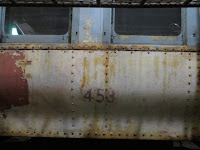I would much rather be working on lobster traps for the 714, but in times like these you have to take whatever jobs are available. And so as long as the 453 is in the roof booth, it's either continue needle chipping or stay home.
Today I decided to see how it works on the lower side of the car. Very little of the side is accessible because of the shelves in the scaffolding, but here's one section. I verified that Frank had indeed traced this particular number, and then started with the needle chipper.
After a few minutes, it looks like this. The red comes off easily, but the original white primer underneath just will not come off at all. That's actually pretty much the same results as the letterboard, except that the red is more fragile. We believe the red was probably repainted at Wheaton after service ended, and they were making half-hearted attempts to preserve the 450's for possible resale.
I asked Pete Galayda, our paint expert, to take a look at it. He suggests that after needle chipping, it should be sufficient to sand down the primer until it's smooth, and then apply a new coat of primer. That sounds much easier than wire-wheeling the entire surface to bare metal.
So I spent most of the rest of the day needle-chipping the letterboard again. I finished the south side.
One needs to take frequent breaks, or your hands will seize up. But slow and steady progress is good.
It's sort of strange how the original red Futura lettering has survived so long. You may have noticed this with the number 453 up above.
And after the letterboard was done, it was time to start on the end. Before:
And after:
Working around the corners is more difficult because of the layout of the scaffold. It's important to be very careful in this dangerous situation. Remember, this was the first day of fall.
Meanwhile, Pete and Fritz continue to do excellent work on the beautiful interior of the 160. They're going along so fast it's almost a blur.
And here's one of the doors, waiting for installation.
Meanwhile, tomorrow will be the first day of the annual Arnfest at IRM. So a couple of guys were here getting things set up. The Car Dept. graciously allows them to use the Lean-2 and Lean-3 each year, and here we can see how unusually clean and empty they both are.
So step right up, ladies and gentlemen, if you're interested in old woodworking machines we can sign you in right here.
In other news, Bill W. was working on cleaning and repairing various parts, but I didn't get a picture.
The 101 was on the inspection pit. A couple of weeks ago, since headlight circuits have been under study, I looked at the 101 when it was over in Barn 8, but I was unable to find where the headlight plugs in.
But once the car's over the pit, the receptacle is fairly easy to find. I hope.
So that's our educational information for today.
























































